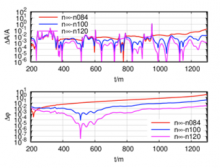
Abstract
We perform a sequence of binary black hole simulations with increasingly small mass ratios, reaching to a 128:1 binary that displays 13 orbits before merger. Based on a detailed convergence study of the q=m1/m2=1/15 nonspinning case, we apply additional mesh refinements levels around the smaller hole horizon to reach successively the q=1/32, q=1/64, and q=1/128 cases. Roughly a linear computational resources scaling with 1/q is observed on 8-nodes simulations. We compute the remnant properties of the merger: final mass, spin, and recoil velocity, finding precise consistency between horizon and radiation measures. We also compute the gravitational waveforms: its peak frequency, amplitude, and luminosity. We compare those values with predictions of the corresponding phenomenological formulas, reproducing the particle limit within 2%, and we then use the new results to improve their fitting coefficients.